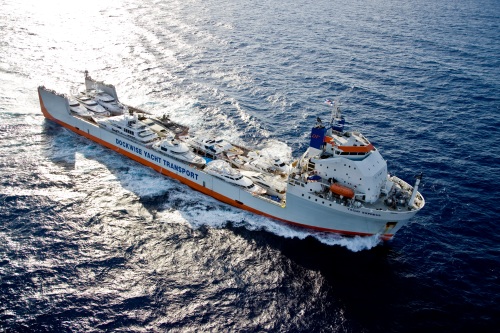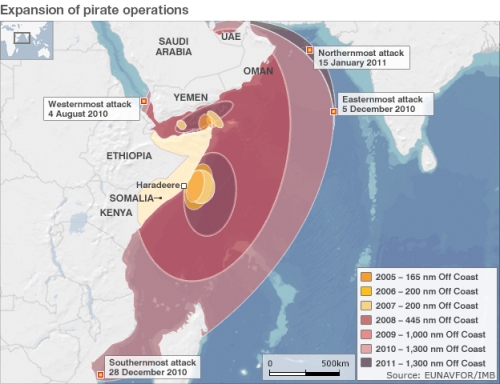A report from the Anti-Piracy Conference in Dubai this week in the National.ae says that the UAE has rightly taken the lead in bringing together partners from all over the world to discuss how nations can best cooperate to diminish the threat of piracy. But while international patrols and joint maritime agreements may temporarily address the issue, the ultimate solution lies in stabilizing Somalia.
“With a thriving black market on the Somali coast, ransoms of up to $10 million (Dh36.7million), and the lack of international will to prosecute pirates, there has been little to dissuade Somali men from turning to pirate gangs.
Somalia’s hobbled government, which was represented at yesterday’s conference in Dubai, appears incapable of solving this crisis alone. “We know we will win,” Mohammed Abdulahi Omar Asharq, the foreign minister of Somalia’s transitional federal government, told an audience of more than 50 dignitaries from around the world. “But how long it takes and at what cost will depend on your response, your partnership and your leadership.”

UAE Foreign Minister H.H Sheikh Abdullah Bin Zayed Al Nahyan and his Syrian counterpart Walid Moallem meet at talks in Dubai. Photo: mofa.gov.ae.
The international community has already taken significant steps to diminish attacks that have emanated from Somalia’s impoverished shores.
The Internationally Recommended Transit Corridor in the Gulf of Aden, which is patrolled by EU and Nato naval forces, has greatly deterred tanker attacks. Cooperation between nations, meanwhile, has helped to save hostages, as was the case this month when UAE forces rescued a hijacked crew with the help of the US Fifth Fleet.
But as yesterday’s conference in Dubai revealed, there is a lot to do. From Yemen’s beleaguered fishing community to the enormous trade volume that passes through Dubai’s docks, piracy has hit regional industries hard. Rising insurance rates and the high price of prosecution can cost the shipping industry millions, while companies are also having difficulty recruiting mariners as hostage situations become more deadly.
The UAE has done well to take the lead in bringing together partners from all over the world to discuss how nations can best cooperate to diminish the threat of piracy. But while international patrols and joint maritime agreements may temporarily address the issue, the ultimate solution rests in stabilizing Somalia. Piracy and its spoils can have proven irresistible for the many who lack an education, a job, or a better prospect for their future.”
Comprehensive global response to piracy off Somalia needed
Secretary-General Ban Ki-moon today called for a comprehensive response to maritime piracy off the coast of Somalia, saying the menace is a consequence of the overall insecurity, lack of a stable national government and underdevelopment in the Horn of Africa country.
“Piracy is not a water-borne disease. It is a symptom of conditions on the ground, including the overall security and political situation in Somalia,” Mr. Ban said in a message to a conference on piracy in Dubai, whose theme is “Global Threat, Regional Responses: Forging a Common Approach to Maritime Piracy.”
“Therefore, our response must be holistic and comprehensive, encompassing simultaneous action on three fronts: deterrence, security and the rule of law, and development. We must work with the Somalia authorities, and we must weave our counter-piracy efforts into an overall solution for Somalia,” said Mr. Ban in the message, which was delivered on his behalf by Patricia O’Brien, Under-Secretary-General for Legal Affairs.
Mr. Ban pointed out that his former Special Adviser on Legal Issues Related to Piracy off the Coast of Somalia, Jack Lang, had outlined how Somalia and the international community can legally step up counter-piracy efforts. One of the measures recommended by Mr. Lang is the consolidation of international assistance for increasing prison capacity.
“Some of his recommendations are already being implemented, albeit on a modest scale, with the assistance of UNODC [UN Office on Drugs and Crime] and UNDP [UN Development Programme.],” said the Secretary-General.
He also informed the conference that the Security Council had last week decided to urgently consider the establishment of specialized Somali courts to try suspected pirates both in the Somalia and in the region, one of Mr. Lang’s recommendations.
He said that the trust fund for counter-piracy administered by the UN had also proved to be an efficient instrument. During its first year, the fund approved 12 projects worth $4.3 million, and total contributions reached $6.2 million.
“This is an encouraging start, but much more needs to be done. I urge you to attend the fundraising event being convened tomorrow by the United Arab Emirates and the United Nations, and to generously support the fund’s important work,” he said.
He deplored the violence and hostage-taking associated with piracy, saying it had taken a heavy human toll, especially for seafarers. Piracy is also distorting the Somali economy and disrupting shipping lanes that are vital to people around the world, he added.
“And the pirates’ reach is expanding. Piracy seems to be outpacing the efforts of the international community to stem it,” said Mr. Ban. “I therefore reiterate the commitment of the United Nations to work with the international community and the Somali authorities to implement a comprehensive strategy for a sustainable solution to this global menace.”
From: eturbonews.com.
Oman has it’s say
Hosted by UAE’s Minister of Foreign Affairs, Sheikh Abdullah bin Zayed al Nahyan, the conference has brought together industry experts and governmental representatives from around the world, including key-note speeches and group discussions throughout the two-day event.
Peter Ford, chief executive officer, Port of Salalah who has been invited by the conference organizers, told Muscat Daily, that there is a significant interest from all parties affected by the piracy to find a solution. “We will work with the top decision-makers in the maritime industry to try and improve the situation. The piracy issue is being discussed at the highest levels in Oman.”
This year, there have been 107 incidents of hijacking by pirates based in Somalia, with 17 vessels taken by pirates, according to figures from the International Maritime Bureau. More than 500 crew members are currently being held hostage either at sea or in lair along the Somali coast, with seven fatalities in piracy-related incidents.
The Affect on Cruising Rallies
Members of the recently canceled Blue Water Rally (BWR) have said that the fatal hijacking of one of the participating yachts in February highlighted the risks in continuing with the journey and resulted in a premature conclusion for the adventure.
In an exclusive interview with Muscat Daily, the husband and wife crew of the Bali Blue, who had been at sea for two years, said that the number of pirate attacks in the waters around Oman have made the region too dangerous to sail through.
They added that the deaths of the four crew members of the Quest, which was also participating in the rally and approaching Salalah, at the hands of pirates, brought home the reality of the risks involved.
“It was devastating,” said Bali Blue skipper Pete Bailey, “We were all at sea at the time and taking precautions such as maintaining radio silence. When we got the news of the Quest, everyone was profoundly affected. There was a belief amongst some people that the chances of a yacht being taken were low, and it could be minimised if we took sensible precautions.”
“The chances of a yacht falling prey to pirates here have increased substantially. There are others who have the intention of coming here and may be months away in their journey, and they really need to be made aware.”
His wife Carol added that the difficulty of those crewing the fleet of yachts in trying to complete their journey evaporated in the wake of the hijacking of the Danish ING, the crew of which are still being held by Somalian pirates, and the disaster that unfolded on the Quest. “In a matter of minutes it had become very personal, and it was an awful outcome. My difficulty lay in justifying to my family the continuation of the trip and another couple of weeks of risky passage.”
During their voyage, they have seen international naval vessels combating piracy from Europe, Russia, China, India and the US, but none from nations in the region. “Years ago, the Malacca Straits were the equivalent of what is happening today, and with a collaboration between Asian countries, they got it under control. Something similar has to be done in this region too,” Carol said.
The Baileys, along with 20 private cruising yachts from the Blue Water Rally, decided to place their boats on board a Dockwise Yacht Transport vessel rather than risk the passage from Salalah, Oman to Marmaris, Turkey. Read: Dockwise Yacht Transport to deliver 20 cruising sailboats from Oman.
Hopefully the Dubai Conference will result in some concrete steps that can be taken now to protect recreational yachts and cruisers in this dangerous part of the world.


















